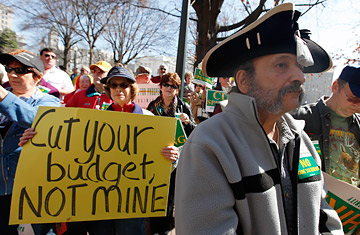
Members of the Virginia Tea Party gather in Richmond for a rally on March 8, 2010
(3 of 3)
But while Tea Party leaders say they aim to spur critical thinking, at times the candidates and crowd seemed gripped by groupthink. Tea Party volunteers distributed slips of paper with the group's core principles — limited government, fiscal responsibility, individual liberty, free market and constitutional governance — and asked the audience to tick off boxes next to candidates whose answers matched those tenets. "Government is there to protect the people. It's only there to provide security. And now it's usurping more and more duties," says Israel Jackson, a Liberty University student volunteering on Campbell County businessman Ron Ferrin's campaign. A former Obama supporter, Jackson dissected both parties' platforms and decided the GOP was the one hewing to the framers' principles. "It's almost a group-therapy thing," Lloyd says of the passion coursing through Tea Party events. "For years, they've felt isolated. If they spoke their true feelings, they'd be vilified. If there's been anything rewarding, it's to see these people realize they're not alone."
Feda Morton, the only woman in the race, has been a teacher, a state-championship basketball coach, a school-board member and a Republican organizer. A diminutive mother of five sporting a sparkling flag pin, she fidgeted as she recited the merits of her candidacy in an interview with TIME. When the topic turned to Barack Obama, she confessed deep fears. "I don't think the President really cares about our health care," Morton says. "He's not trying to lead America. He's trying to position himself to be a leader higher up, and the only way he can do that is to bring America into the whole one-world-order concept." Obama, she adds, belongs to a plutocratic cabal that manufactures crises for personal profit, foisting scams like health care reform and global warming on U.S. taxpayers to depress the economy. "Look at who his czars are," she says. "He's tied very closely to George Soros, European socialist organizations, Howard Dean. These people all play into this one-world order, one-world money system. And it's to make money for them." In an assessment of the candidates, Tea Party leaders note that Morton has "passion to loan." The same could be said of Nigel Coleman, chairman of the Danville Tea Party, who scrapped plans to burn effigies of Perriello and House Speaker Nancy Pelosi at a November rally after the idea garnered negative attention.
This enthusiasm on display in Lynchburg is not without risks for the GOP. "In the beginning, maybe these activists wanted to push the Republican Party in a more conservative direction, and they were willing to do whatever it took," says Isaac Wood, a political analyst at the University of Virginia. "Now that they're getting involved in the political process, they may realize that Goal No. 1 is unseating Perriello, and nominating as conservative a person as possible is No. 2." The fervor could end up hurting them, Wood adds, if one of the Tea Party hopefuls decides to run as a third-party candidate. Some handicappers have suggested the race could follow the same trajectory as the special election in New York's 23rd Congressional District, where conservative leaders embraced a third-party candidate instead of a more moderate Republican, allowing a Democrat to capture the contest.
Several Tea Partyers rejected the analogy, saying the crowded field attests to Perriello's flaws and the growing conviction that spendthrift politicians have brought the U.S. to the brink of ruin. But many hold both parties responsible. Several of the candidates griped about the local Republican leadership's decision to choose the party's nominee through a primary — which favors household names like Hurt — instead of a convention, which would level the playing field and curb costs. If Hurt is the nominee, says Feigel, the Tea Party Web designer, "I may stay home."
The original version of this article stated that Robert Hurt voted for mandatory HPV vaccines for children. The bill Hurt voted for included an opt-out clause for parents.
